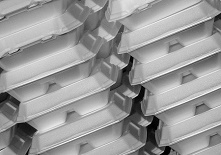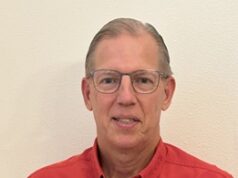 NEW YORK—The de Blasio Administration announced that as of July 1, 2015, food service establishments, stores and manufacturers may not possess, sell, or offer for use single service Expanded Polystyrene (EPS) foam articles or polystyrene loose fill packaging, such as “packing peanuts” in New York City.
NEW YORK—The de Blasio Administration announced that as of July 1, 2015, food service establishments, stores and manufacturers may not possess, sell, or offer for use single service Expanded Polystyrene (EPS) foam articles or polystyrene loose fill packaging, such as “packing peanuts” in New York City.
After consultation with corporations, including Dart Container Corp., nonprofits, vendors and other stakeholders, the Department of Sanitation (DSNY) has determined that Expanded Polystyrene (EPS) Foam cannot be recycled, which led to the ban. DSNY also determined that there currently is no market for post-consumer EPS collected in a curbside metal, glass, and plastic recycling program. As a result of the ban, manufacturers and stores may not sell or offer single-use foam items such as cups, plates, trays, or clamshell containers in the city. The sale of polystyrene loose fill packaging, such as “packing peanuts” is also banned.
“These products cause real environmental harm and have no place in New York City,” said Mayor Bill de Blasio. “We have better options, better alternatives, and if more cities across the country follow our lead and institute similar bans, those alternatives will soon become more plentiful and will cost less. By removing nearly 30,000 tons of expanded polystyrene waste from our landfills, streets and waterways, today’s announcement is a major step towards our goal of a greener, greater New York City.”
NYC Cannot Recycle the Material
“While much of the waste we produce can be recycled or reused, polystyrene foam is not one of those materials,” said Sanitation Commissioner Kathryn Garcia. “Removing polystyrene from our waste stream is not only good for a greener, more sustainable New York, but also for the communities that are home to landfills receiving the city’s trash.”
“NYC is now the largest city in the country to ban EPS foam, and we hope this will inspire others to do the same,” said Nilda Mesa, Director of the Mayor’s Office of Sustainability. “This ban will improve our rivers and waterfront and ultimately the Atlantic Ocean with its rich fisheries and marine life. The ban on EPS foam products marks another step forward as we work toward an even greener, more sustainable NYC—from cleaner air and dramatically reduced emissions, to now ending the sale and use of non-biodegradable products like EPS foam. As New Yorkers, we all breathe the same air and drink from the same water supply; we must leave a legacy that will make our kids proud.”
The determination was made after considering environmental effectiveness, economic feasibility, and safety for employees of DSNY and Sims Municipal Recycling, the city’s recycling processor. The analysis was based on a recycling strategy that would have incorporated EPS into the current metal, glass, plastic and carton commingled collection program and that would not create a separate collection or sorting program.
Law Passed by City Council in 2013
Local Law 142, passed by the City Council in December 2013, required the sanitation commissioner to determine “whether EPS single service articles can be recycled at the designated recycling processing facility at the South Brooklyn Marine Terminal in a manner that is environmentally effective, economically feasible, and safe for employees.” Under the law, if EPS is not found to be recyclable, it must be banned.
The law allows businesses a six month grace period from when the law goes into effect—January 1, 2016—before fines can be imposed. DSNY, the Department of Health and Mental Hygiene, and the Department of Consumer Affairs will conduct outreach and education in multiple languages to businesses throughout all five boroughs during this period. For the first year of the ban, businesses will be given a warning in lieu of a fine.
Nonprofits and small businesses with less than $500,000 in revenue per year may apply for hardship exemptions from the Department of Small Business Services (SBS) if they can prove that the purchase of alternative products not composed of EPS would create undue financial hardship. SBS will begin accepting applications for hardship waivers in March 2015.
About Expanded Polystyrene:
• Expanded polystyrene is a plastic resin manufactured into consumer products such as “foam” cups, containers, trays, plates, clamshell cases and egg cartons.
• DSNY collected approximately 28,500 tons of expanded polystyrene in Fiscal Year 2014 and estimates that approximately 90 percent of that is from single-use food service products like cups, trays and containers.
• EPS is a major source of neighborhood litter and hazardous to marine life. EPS foam is a lightweight material that can clog storm drains and can also end up on beaches and in New York Harbor. EPS containers can break down into smaller pieces, which marine animals may mistake for food. The environmental assessment prepared for the bill found that expanded polystyrene particles can wind up in the harbor, and in the floating gyre of non-biodegradable plastic debris that has been found in the Atlantic Ocean—creating a hazard for marine life such as sea turtles and fish.
• EPS is a contaminant of the city’s organics program. The presence of EPS foam in NYC’s waste stream has a detrimental effect on the city’s organic collection program. During the collection process, foam can break down into small pieces that get mixed in with and contaminates organic material, rendering it unmarketable for anaerobic digestion or composting.
EPS is already banned in cities across the country, including Washington, D.C., Minneapolis, San Francisco, Oakland, Portland (Ore.), Albany, and Seattle. In total, more than 70 cities have banned foam and businesses large and small have shifted to alternative products that are biodegradable or otherwise recyclable.
Click here for additional details.







